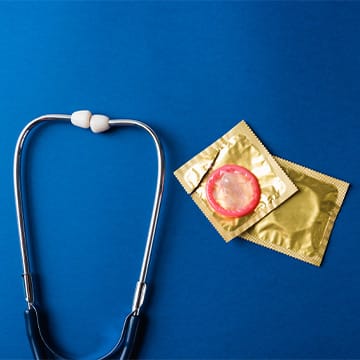
QUICK LINKS

What are STIs/STDs?
Sexually transmitted infections (STIs) and sexually transmitted diseases (STDs) are conditions that are generally spread from one person to another through sexual contact. They can be caused by bacteria, viruses, or parasites, and can affect both men and women.
Individuals with STIs and STDs experience no symptoms at all, but if they do experience symptoms, they may include:
“I highly recommend Dr. Tepper!He is highly professional, experienced, and calming. My pregnancy and birth were such a positive experience thanks to him and his lovely staff at the clinic.”
SEE MORE- Burning urination.
- Sores or bumps on the genitals.
- Discharge from the penis or vagina.
- Pain during sex.
- Vaginal bleeding.
- Swollen or sore lymph nodes.
- Fever.
- And more.
Individuals who are sexually active are always at some risk of exposure to an STD or STI, though factors that may increase the chances of contracting one include having unprotected sex, having sex with multiple partners, having a history of STIs, being young, or injecting drugs (which is associated with HIV, and hepatitis B and C).

MEET DR. ALEX TEPPER
Welcome to my practice. Let me introduce myself and my practice philosophy. I am a board certified OB/GYN in practice for over 20 years and have been a solo-practitioner on the Upper East Side of Manhattan since 2000. All deliveries are performed at The Mount Sinai Medical Center where I went to medical school and at Lenox Hill Hospital.
Diagnosis and Treatment of STIs/STDs
If you are experiencing symptoms associated with an STI or an STD, Dr. Tepper will perform a physical or pelvic exam to search for signs of infection. He may also have you undergo some testing, including blood tests, urine samples, or fluid samples for a proper diagnosis.
If you find that you have tested positive for an STI or STD, there are a variety of treatment options available depending on your diagnosis. Treatment may involve one of the following:
- Antibiotics: A single dose of antibiotics can often cure many forms of sexually transmitted bacterial and parasitic infection. It is important that you finish the entire prescription of antibiotics in order to completely eliminate the infection. It is also important to abstain from sex until seven days after you have completed your antibiotics and any sores that were present have healed.
- Antiviral drugs: If you are diagnosed with herpes or HIV, you will be prescribed antiviral medication. This will help to lessen the number of herpes breakouts you experience or keep HIV in check for many years.
Individuals who have an STI should speak with Dr. Tepper regarding when they should be retested. This is necessary to ensure that your STI has cleared up and that you have not been reinfected.
STI/STD Prevention
Overall, there are many different steps you can take to avoid or reduce your risk of getting an STI or STD. These include the following:
- Abstain from sex.
- Only have sex with one uninfected partner.
- Avoid sex with a new partner until you have both been tested for STIs and STDs.
- Use condoms or other forms of contraception correctly and consistently.
- Get vaccinated with the HPV vaccine.
- Avoid drinking alcohol excessively or using drugs.
BOOK AN APPOINTMENT
Whether you are a new or returning patient, Dr. Tepper can assess your concerns and discuss your options to find the most comfortable and convenient care for you. To get started, call our office to set up an appointment.
CALL FOR APPOINTMENTContact Us to Learn More
If you are experiencing symptoms associated with an STI or STD, do not hesitate to contact our New York office today. Your first step toward treatment will be to schedule an appointment with Dr. Tepper.
Our Blog

Preterm Labor: Are You At Risk?

Postpartum Depression: Symptoms, Causes, and Treatments



